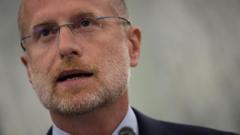
US President-elect Donald Trump has nominated Brendan Carr to lead the Federal Communications Commission (FCC) as its chairman, a move that highlights Trump’s ongoing focus on media and technology regulation.
Carr, currently the senior Republican on the FCC, is known for his critical stance towards major social media platforms and their content moderation practices. He has been particularly vocal about what he perceives as censorship of conservative viewpoints on social media sites, with the notable exception of X (formerly Twitter), which is owned by Elon Musk, a Trump supporter.
Trump praised Carr as a “warrior for free speech” and criticized what he sees as regulatory obstacles that have hindered economic growth. Carr himself expressed enthusiasm for the role, stating on X that he intends to “dismantle the censorship cartel.”
Carr’s background is notable for his bipartisan appeal. He has been nominated for FCC roles by both Trump during his first presidency and by current President Joe Biden. A lawyer by training, Carr has transitioned from being a traditional establishment Republican to aligning more closely with Trump’s political priorities in recent years.
As part of his policy approach, Carr contributed a chapter to Project 2025, a conservative Heritage Foundation document outlining potential policies for a second Trump administration. Although Trump has publicly distanced himself from the document, Carr’s chapter includes several key proposals:
1. Implementing transparency rules for tech giants like Google and Facebook
2. Improving rural broadband access
3. Taking a stricter stance on TikTok due to its Chinese ownership
During his campaign, Trump has also suggested more aggressive media regulation, including threatening to revoke licenses of television channels he considers biased.
Carr’s nomination is part of Trump’s broader effort to assemble his administration ahead of his January 20th inauguration. However, his appointment, like several other key positions, will require Senate confirmation, which could potentially face challenges.
The nomination reflects the ongoing tension between technology companies and conservative political figures who argue that these platforms unfairly moderate content. Carr’s selection signals a potential continuation of Trump’s confrontational approach to big tech regulation.
While Carr has been a consistent figure in communications regulation, his recent alignment with Trump’s priorities suggests a more aggressive regulatory stance may be forthcoming. His focus on perceived censorship and desire to increase transparency in tech companies’ operations could significantly impact the digital media landscape.
The nomination underscores the continued political importance of media and technology regulation, with potential implications for free speech, content moderation, and the relationship between government and technology platforms.









